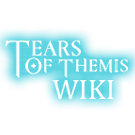Game mechanics
Debates[edit | edit source]
Debates are the "battle" stages in Tears of Themis. In debates, there will be an enemy who will have various arguments with HP. The player attacks the enemy by selecting their cards to use against enemy's arguments and lower the enemy's HP. Each card selection is a turn, and the player has a limited amount of turns to complete the stage. Additionally, every time a player selects a card to use, the enemy's "thought cloud bubble" will charge. Once it's fully charged, the enemy will attack and lower the player's HP.
If a player runs out of cards, they can refresh the deck at the cost of 1 turn.
Once all arguments have been defeated, the player wins stage. Players can be defeated though if they:
- Run out of turns
- The player's HP reaches 0
Attributes[edit | edit source]
Arguments and cards will have different attributes: Intuition, Logic, Empathy, or Null (no typing). The attribute of the card you select will affect how much damage your attack does. Strong attacks will deal 1.5x damage while weak attacks will do 0.5x damage. Attacks that are neutral or against Null will do 1.0x damage.
| Type | Strong Against | Weak Against |
|---|---|---|
One easy way to remember typings are by color and converting them into elements used in other games. For example, Logic is blue and correlates to Water, which beats Empathy's red (Fire), but weak against Intuition's green (Grass).
Cards[edit | edit source]
- See also: Cards
Skills[edit | edit source]
- See also: Skills
Cards will also have skills. Some cards have skills which passively take effect, and others have skills which take effect when a player selects them.
Cards will affect Influence (Attack stat) or Defense such as boosting your own Influence/Defense stats or lowering the enemy's Influence/Defense stats to boost damage/lower damage you take.
Some cards will even have skills that passively boost the base stats of cards, such as Formidable cards that boost Influence when equipped from the Support deck.
Damage Calculations[edit | edit source]
- See also: Deck#Power Calculations, Cards#Power Calculations
[math]\displaystyle{ damage = attackValue * (1 - defenceValue) * attributeAddRate * giftSkillAddRate? }[/math]
Attack[edit | edit source]
playerAttackValue[edit | edit source]
[math]\displaystyle{ playerAttackValue = (cardInfluence * 2 + deckTotalInfluence) / 5 * (1 + cardGroupAddRate? + playerSkillAddRate?) * (1 + buffAddRate) }[/math]
enemyAttackValue[edit | edit source]
[math]\displaystyle{ enemyAttackValue = enemyInfluence * (1 + buffAddRate) }[/math]
Defense[edit | edit source]
playerDefenceValue[edit | edit source]
[math]\displaystyle{ defenceValue = deckTotalDefence * (1 + totalSupportDeckDefense) * (1 + playerBuffAddRate) }[/math]
[math]\displaystyle{ playerDefenceValue = defenceValue / (30000 + defenceValue) }[/math]
enemyDefenceValue[edit | edit source]
[math]\displaystyle{ defenceValue = bossDefence * (1 + bossBuffAddRate) }[/math]
[math]\displaystyle{ enemyDefenceValue = defenceValue / (30000 + defenceValue) }[/math]
Story Mechanics[edit | edit source]
The story is similar to visual novel where dialogue plays on the screen with character sprites in the background. The story will sometimes present the player with choices. These choices will not have any major effect on the story, will only slightly change the dialogue, and can always be replayed.
In addition to the visual novel portions of the story, the game also has investigative interactive sections of the game as well.
Questioning[edit | edit source]
There are story segments where players must question a character and must find key evidence from the questioning. The questions involve selectable phrases that appear on the screen that will then trigger questioning and dialogue related to that phrase. Some dialogue reveals important information related to the case that will be logged as key evidence. Some phrases can also unlock additional phrases that the player can ask the character.
Clue Analysis[edit | edit source]
Clue Analysis involves inspecting an item, looking for spots of interest, and trying to unlock clues related to the case from the item. The item is in a 3D space, so players can revolve the item in different directions to try to look for clues.
Inspection[edit | edit source]
Inspection consists of analyzing a character for features that stand out about them. Tapping a key section of the character can then either trigger dialogue or show a zoomed-in pop up of the area where you can further inspect the character's. Some zoom-in areas can consist of more than one clue.
If having trouble finding an inspection area, tap the magnifying glass in the top left corner to show the areas of interest.
Investigation[edit | edit source]
During Investigation, a player will be presented with a scene where they will need to look for evidence and items of interest by tapping on them. There can also be items you can in the scene which trigger dialogue but may not count as evidence.
If having trouble finding items, tap the magnifying glass in the top left corner to show key evidence items.
Trials[edit | edit source]
At the end of most episodes, players will then take all the evidence they've gathered to go to court and aim to win for their client.
As the trial progresses, evidence will be asked to be shown to prove certain points. Selecting the wrong evidence will not penalize the player, and they can choose to select an evidence as many times as they want.
There will also be some parts of the trial where the player may be asked to choose between two dialogue options. For most dialogue choices, any of the options is usually fine as you can either re-select or the trial will continue the same with slightly different dialogue for one or two lines.
Episode 1's Trial case is an example of this, where the dialogue differs but the trial result is the same. Episode 1's Trial is a bit of an exception though in that the player's choice will also affect the dialogue for the next chapter as well. The trial can still be replayed though to see the other result.
